专八听力策略(二)
英语专八考试新闻听力小技巧

英语专八考试新闻听力小技巧英语专业八级考试一直受到院校、教师和学生们的高度重视。
英语专业八级考试由听力、改错、阅读理解、人文知识、翻译、写作等题型构成,旨在全面考察英语语言综合运用能力。
因此,只有研究专业八级考试各部分题型内容,探索出应对的适当策略,才能指导学生提高英语综合水平,在考试中取得良好成绩。
下面小编整理的英语专八考试新闻听力小技巧,以供大家学习参考。
英语专八考试新闻听力小技巧贴士一:一要一不要一要:要捕捉第一句话。
新闻的文体结构特色鲜明,即呈“倒金字塔"结构,重点信息集中在开头尤其第一句话,接下来则是侧重细节展开的分述性信息。
开头第一句话为新闻导语,相当于全文的主题句,要详细把握和听懂这一句话,从而掌握全文基调,利于理解。
一不要:不要被个别专用名词迷惑。
不能被个别专有名词如人名、国名地名、组织机构名等吓倒。
要知道,对于绝大部分考题,这些专用名词听不懂也不影响解答,因此属于可忽略不听的信息。
贴士二:新闻六要素(简称5W+1H)一篇标准的新闻报道,必须包括六大要素:When--新闻发生时间Where--新闻发生地点Who--新闻涉及人物What--所发生的新闻时间Why--为何会发生这一新闻时间How--新闻事件的背景,如何会诱发、促成这一事件;后续情况如何如果善于在听的时候把握以上新闻六要素,就可轻松理清头绪,条分缕析地掌握新闻内容。
贴士三:上下文很重要由于新闻播报的特殊性,一篇新闻内在结构往往非常紧密,内容环环相扣。
如果遇到某些听不懂的内容,马上结合上下文,尤其是开头的新闻导语主题句,借助全篇总体内容,理解听到的个别细节。
贴士四:平日要多多积累另外,平时也要多注意积累,多听多看中文新闻,熟悉最新的国际时事,尤其政治、经济、军事、重大科研进展等方面的事件,这样再过渡到听英语的新闻,就可借助现有知识来帮助理解。
英语专业八级听力训练计划
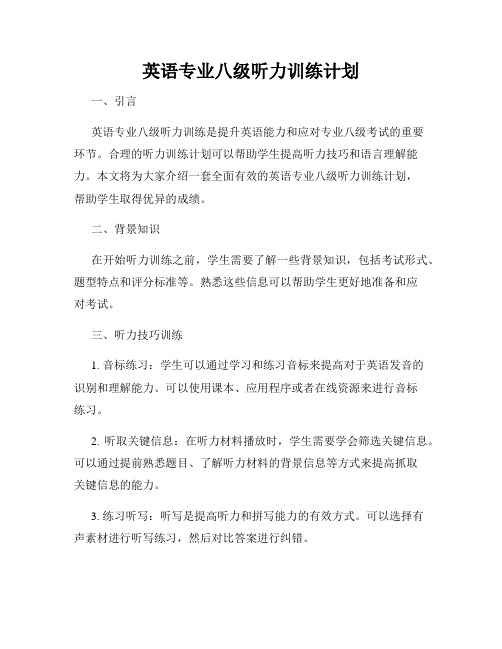
英语专业八级听力训练计划一、引言英语专业八级听力训练是提升英语能力和应对专业八级考试的重要环节。
合理的听力训练计划可以帮助学生提高听力技巧和语言理解能力。
本文将为大家介绍一套全面有效的英语专业八级听力训练计划,帮助学生取得优异的成绩。
二、背景知识在开始听力训练之前,学生需要了解一些背景知识,包括考试形式、题型特点和评分标准等。
熟悉这些信息可以帮助学生更好地准备和应对考试。
三、听力技巧训练1. 音标练习:学生可以通过学习和练习音标来提高对于英语发音的识别和理解能力。
可以使用课本、应用程序或者在线资源来进行音标练习。
2. 听取关键信息:在听力材料播放时,学生需要学会筛选关键信息。
可以通过提前熟悉题目、了解听力材料的背景信息等方式来提高抓取关键信息的能力。
3. 练习听写:听写是提高听力和拼写能力的有效方式。
可以选择有声素材进行听写练习,然后对比答案进行纠错。
4. 提高听力速度:学生可以通过听力材料的连续播放来提高听力速度。
可以逐渐增加播放速度,锻炼快速听取信息的能力。
四、听力材料选择1. 音频课程:学生可以选择专门针对专业八级听力训练的音频课程进行学习。
这些课程通常包含丰富的听力材料和针对性的讲解,可以帮助学生更好地理解和应对考试。
2. 英语电影和纪录片:通过观看英语电影和纪录片,学生可以接触到真实场景中的英语对话,提高听力技巧和理解能力。
3. 英语新闻和广播:通过收听英语新闻和广播,学生可以锻炼对于快速和标准英语的听力理解能力。
五、听力训练计划基于以上技巧和材料选择,我们提出如下英语专业八级听力训练计划:1. 每周进行至少3次的听力训练,每次训练时间不少于30分钟。
2. 每次训练前,学生可以先进行音标练习,熟悉音标的发音规则和读音。
3. 在训练过程中,可以选择各类听力材料进行练习,包括音频课程、英语电影、纪录片、英语新闻和广播等。
4. 在完成听力练习后,可以选择进行听写练习,提高听力和拼写能力。
5. 定期对自己的听力水平进行评估和反思,发现问题并进行针对性的训练。
英语专八听力考试备考策略
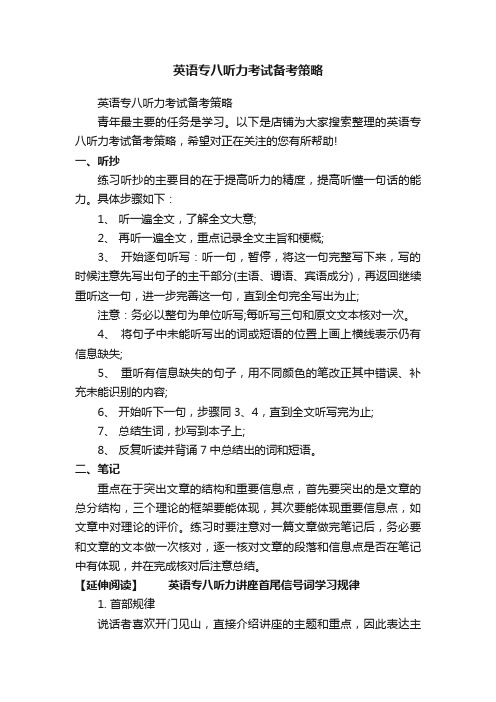
英语专八听力考试备考策略英语专八听力考试备考策略青年最主要的任务是学习。
以下是店铺为大家搜索整理的英语专八听力考试备考策略,希望对正在关注的您有所帮助!一、听抄练习听抄的主要目的在于提高听力的精度,提高听懂一句话的能力。
具体步骤如下:1、听一遍全文,了解全文大意;2、再听一遍全文,重点记录全文主旨和梗概;3、开始逐句听写:听一句,暂停,将这一句完整写下来,写的时候注意先写出句子的主干部分(主语、谓语、宾语成分),再返回继续重听这一句,进一步完善这一句,直到全句完全写出为止;注意:务必以整句为单位听写;每听写三句和原文文本核对一次。
4、将句子中未能听写出的词或短语的位置上画上横线表示仍有信息缺失;5、重听有信息缺失的句子,用不同颜色的笔改正其中错误、补充未能识别的内容;6、开始听下一句,步骤同3、4,直到全文听写完为止;7、总结生词,抄写到本子上;8、反复听读并背诵7中总结出的词和短语。
二、笔记重点在于突出文章的结构和重要信息点,首先要突出的是文章的总分结构,三个理论的框架要能体现,其次要能体现重要信息点,如文章中对理论的评价。
练习时要注意对一篇文章做完笔记后,务必要和文章的文本做一次核对,逐一核对文章的段落和信息点是否在笔记中有体现,并在完成核对后注意总结。
【延伸阅读】英语专八听力讲座首尾信号词学习规律1. 首部规律说话者喜欢开门见山,直接介绍讲座的主题和重点,因此表达主旨或谈话的目的的语句往往出现在开头部分,听懂此处是把握主旨题的`重点。
引入Topic信号词:※ Today, we’ll focus on discuss….※ Today, our topic is…※ Today, I will be talking about...※ T oday let’s begin to look at…※ I want to continue our discussion about …specifically today, I want to talk about…※ I’d like to continue with the topic of …, but I wan t to focus on …※ OK, another… we need to discuss is…还有另一种情况也经常出现,教授并不直入主题,而是先做一些review或者回顾background information,给学生一些时间进入状态(有时可以持续30秒以上)。
英语专业八级听力特点与听力教学的方法和策略

贵州民族 学院学报 ( 哲学社 会科学版) Jun l t u huU i rt f ai aie P i sp yadS c l c ne o ra o G i o nv sy o N t nli z e i r o t s( hooh n oi i c ) l aS o
一
解 能 力 , 考 察 了学 生 略写 、 记 的 能力 , 还 速 只有 记 录 的信息 越 全 面 , 空 才 能 得 心应 手 。Sci 填 etnB o
cn est n或 It ve 的 录 音 长 度 大 概 为 5分 o vr i ao n ri e w 钟, 围绕一 个 主题展 开 , 个 主题通 常设 及 日常生 这
活 中的事 务 , 如商业 谈话 、 园趣事 、 校 社会 现象 等 。 录音 中说 话者 的谈 话 方 式 较 随 意 和 口语 化 , 别 特 是 口语 的一些 特征 如句 子残缺 、 犹豫 不决 、 多次重 复 等 特 点 造 成 了 听 力 理 解 的 障 碍 。 Sci etn C o N w racs一般 播放 的是 近期 的 V A和 B C e s odat B O B 的新 闻 内容 , 这就 要 求 学 生 不仅 要 熟 悉 近 期 的 国 内外新 闻 , 要 积 累新 闻专 业术 语 以辅 助 理解 材 还 料 的 内容 。这三 部分 共 2 题 , 0道 要求 学生 能听懂 听力材 料 的主 旨并 了解 佐证 主 旨的事 实 和 细节 。 因此 , 将专业 八 级听力 考试 的这 2 0道题 分 为细 节 题 、 点题 、 断题 、 纳题 、 断题及 主 旨题 。 要 推 归 判 如分 析 20 2 1 07— 0 1年各 年 的题 型 , 我们 可 以
专八听力备考策略和技巧分享

专八听力备考策略和技巧分享专八听力备考策略和技巧分享在备考英语专业八级听力考试时,许多考生都感到困惑,因为听力考试通常是让人们感到压力最大的一部分。
然而,如果掌握一些备考策略和技巧,就可以在考试中获得更好的成绩。
本文将向您分享一些备考专八听力的策略和技巧,帮助您更好地应对听力考试。
1. 保持良好的听力习惯首先,良好的听力习惯是取得高分的基础。
在备考期间,您应该尽量多听英语,包括英语新闻、英语电影、英语教材等,以提高自己的听力水平和适应英语语速。
此外,还可以尝试用英语进行日常交流,例如与外教或英语母语人士进行对话练习,逐渐提高听力理解的能力。
2. 训练听力速度和准确性专八听力考试的时间非常有限,因此在备考过程中应注重训练听力的速度和准确性。
可以使用一些专门的听力练习软件或音频材料,进行高强度的听力练习。
在练习过程中,要注意迅速捕捉关键信息,不要过多纠结于一些细节问题。
同时,还要改善记笔记的能力,将听到的信息有效地记录下来,以便在答题时查找和使用。
3. 拓展词汇量和语法知识听力考试中,词汇量和语法知识也是非常重要的。
备考过程中,应注重扩充词汇量,包括常见词汇、短语和俚语等。
同时,要加强对英语语法的理解,掌握基本的语法规则和句式结构。
这些知识将帮助您更好地理解听力材料中的含义和上下文。
4. 注意听力材料的细节和主旨在备考专八听力时,需要同时关注听力材料的细节和主旨。
细节包括时间、地点、人物关系、信息细节等,而主旨则是整个材料的核心意思和基本观点。
在听力材料播放时,要努力捕捉这些关键信息,并在听完后对其进行整理和概括,以便更好地回答后续的问题。
5. 超越字面意义,注重听力推断专八听力考试中经常涉及一些隐含信息和推断问题,而不仅仅依靠字面意义的理解。
因此,在备考期间,要注重培养自己的推断能力。
可以通过阅读英语文章、学习英语表达等方式,提升对隐含信息和推断的敏感度。
同时,在听力材料中出现推论类问题时,不要只看表面意义,要思考背后的含义和逻辑关系。
英语专业八级听力答题技巧
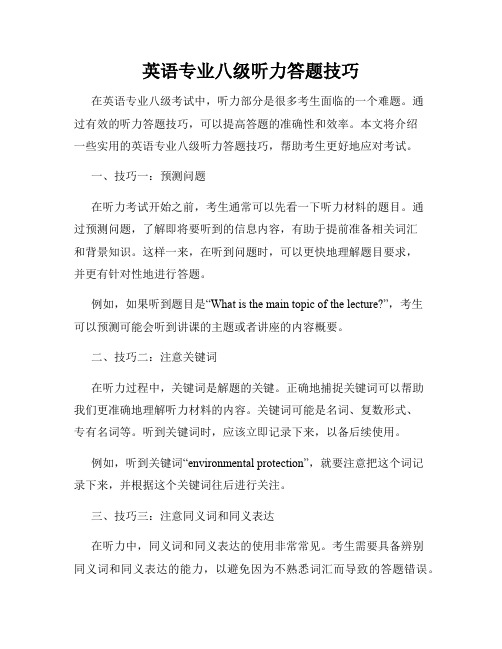
英语专业八级听力答题技巧在英语专业八级考试中,听力部分是很多考生面临的一个难题。
通过有效的听力答题技巧,可以提高答题的准确性和效率。
本文将介绍一些实用的英语专业八级听力答题技巧,帮助考生更好地应对考试。
一、技巧一:预测问题在听力考试开始之前,考生通常可以先看一下听力材料的题目。
通过预测问题,了解即将要听到的信息内容,有助于提前准备相关词汇和背景知识。
这样一来,在听到问题时,可以更快地理解题目要求,并更有针对性地进行答题。
例如,如果听到题目是“What is the main topic of the lecture?”,考生可以预测可能会听到讲课的主题或者讲座的内容概要。
二、技巧二:注意关键词在听力过程中,关键词是解题的关键。
正确地捕捉关键词可以帮助我们更准确地理解听力材料的内容。
关键词可能是名词、复数形式、专有名词等。
听到关键词时,应该立即记录下来,以备后续使用。
例如,听到关键词“environmental protection”,就要注意把这个词记录下来,并根据这个关键词往后进行关注。
三、技巧三:注意同义词和同义表达在听力中,同义词和同义表达的使用非常常见。
考生需要具备辨别同义词和同义表达的能力,以避免因为不熟悉词汇而导致的答题错误。
例如,听到“purchase”的同义词可以是“buy”或“acquire”,听到“important”的同义表达可以是“crucial”或“significant”。
四、技巧四:抓住上下文线索上下文线索是解题时的宝贵线索。
在听力材料中,通常会通过上下文来解释某个生词、短语或表达。
针对这些线索,我们要学会在听力中抓住它们,将它们和问题进行关联,从而更好地理解问题和选择答案。
例如,如果在听力材料中听到“I have always been passi onate about literature”这个句子,可以通过上下文确认这个人对文学非常热爱。
五、技巧五:练习跟读和模仿提高听力的有效方法之一是进行跟读和模仿练习。
如何备考专业八级中的听力部分
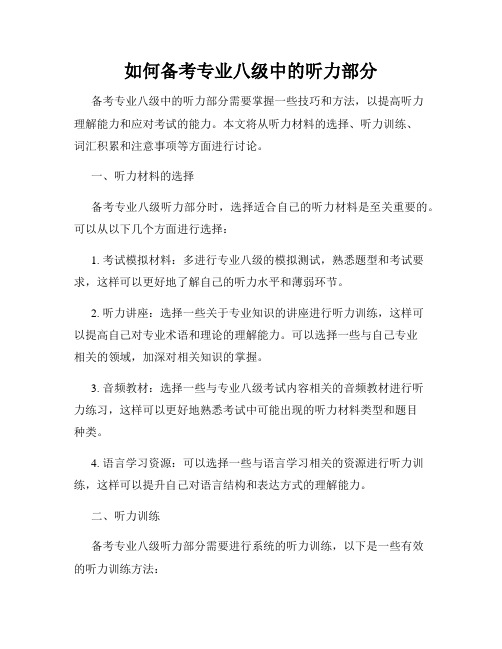
如何备考专业八级中的听力部分备考专业八级中的听力部分需要掌握一些技巧和方法,以提高听力理解能力和应对考试的能力。
本文将从听力材料的选择、听力训练、词汇积累和注意事项等方面进行讨论。
一、听力材料的选择备考专业八级听力部分时,选择适合自己的听力材料是至关重要的。
可以从以下几个方面进行选择:1. 考试模拟材料:多进行专业八级的模拟测试,熟悉题型和考试要求,这样可以更好地了解自己的听力水平和薄弱环节。
2. 听力讲座:选择一些关于专业知识的讲座进行听力训练,这样可以提高自己对专业术语和理论的理解能力。
可以选择一些与自己专业相关的领域,加深对相关知识的掌握。
3. 音频教材:选择一些与专业八级考试内容相关的音频教材进行听力练习,这样可以更好地熟悉考试中可能出现的听力材料类型和题目种类。
4. 语言学习资源:可以选择一些与语言学习相关的资源进行听力训练,这样可以提升自己对语言结构和表达方式的理解能力。
二、听力训练备考专业八级听力部分需要进行系统的听力训练,以下是一些有效的听力训练方法:1. 多听多练:多听多练是提高听力水平的关键,可以选择各种类型的听力材料进行反复练习,并注意不同场景下的语速和语调变化。
2. 分段听力:可以将听力材料分段进行听写和理解,这样可以提升对细节的把握和整体理解能力。
3. 笔记做法:在听力材料播放过程中,可以适当做一些简单的笔记,如画关键词、勾画主题句等,以帮助记忆和整理听到的信息。
4. 听力辅助工具:使用一些听力辅助工具如录音机、手机APP等,反复听取并比对听到的内容,帮助纠正听力中的问题。
三、词汇积累备考专业八级听力部分需要掌握大量的相关词汇,以下是一些词汇积累的方法:1. 专业词汇:根据考试大纲和历年考试的试题,整理相关专业词汇表,重点记忆和理解相关词汇和术语的含义及用法。
2. 同义词汇:学习一些与专业词汇相关的同义词或近义词,扩展自己的词汇量,以便更好地理解和运用。
3. 语境记忆:词汇学习要注重词汇的使用场景和语境,通过听力材料和阅读材料中的应用,帮助记忆和理解词汇的使用方式。
专业八级听力对策

八级听力对策首先是Mini-lecture部分,这是个确实让人挠头的部分,刚开始练习的时候正确率比较低,所以大家一定要耐心,多做练习,反复听,其中做mini的小窍门就是答案大多是名词居多,然后是形容词,最后才是动词。
所以大家听的时候一定要对文章中的名词和形容词多留个心眼儿,还有就是一定要把握文章的结构,参考书大家可以选用《英语听力快速突破—英语专业八级》点此查看。
刚开始用这本书来练习,因为书中的答案讲得比较详细。
练得多了,自然就有感觉了。
还有就是速记符号的使用,这个东西因人而异,所以不必拘泥于一种速记符号,只要自己能明白就好,举例来说,information--info,但是大家千万不要陷入到这样一个误区,就是光想着速记,而忘了你使用这些符号的目的,为的就是得分嘛,所以在听的时候要有个模糊的general idea,通过大约一个月左右的训练,基本上可以达到四五个的正确率了。
如果说mini部分的难度值是9的话,那么下面部分的难度值就会直线下降,但是大家依然还是要给与高度重视,因为这是八级考试。
2. Conversation。
大家在听的时候,一定要提前读题,这不仅包括要读题的题干,还要读题的选项。
大家也许会问,在以前的英语考试中,老师只让我们读题干啊,说不用读题的选项阿?那么我告诉你,这是八级考试,不是大英四六级,所以每个选项都要看,看的时候要标记每个选项的主题词,当然还包括题干的反正意(即到底这句话是肯定的?还是否定的?),尤其要注意提干中的NOT,EXCEPT,INCORRECT,WHY,HOW 等词,这样的词在每年的考试中都几乎出现2-3个,具体可以参看历年试题。
所以做conversation的方法就是,看清题干,看清选项主题词,做出选择!!只要大家每天都坚持练习,相信此部分不会丢很多分,这部分是送分题,可能会有一两个拿不准的,无论是听力,还是阅读,历年试题中答案都有模棱俩可的答案和解析,这也是很多人质疑八级考试可信度的原因。
专八听力Mini-lecture技巧(2)
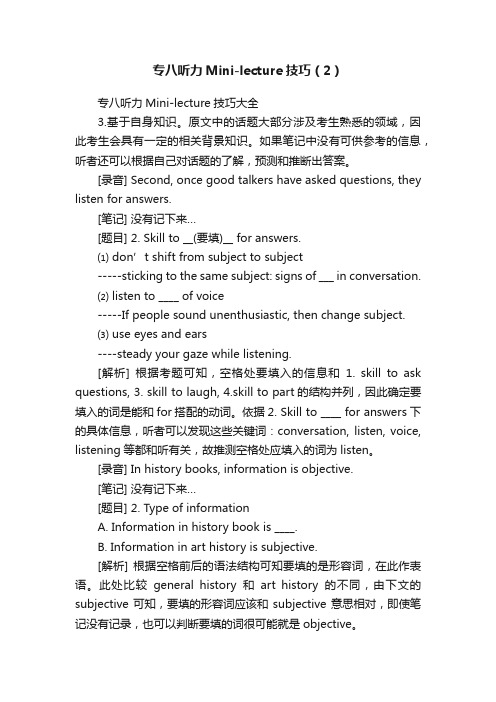
专八听力Mini-lecture技巧(2)专八听力Mini-lecture技巧大全3.基于自身知识。
原文中的话题大部分涉及考生熟悉的领域,因此考生会具有一定的相关背景知识。
如果笔记中没有可供参考的信息,听者还可以根据自己对话题的了解,预测和推断出答案。
[录音] Second, once good talkers have asked questions, they listen for answers.[笔记] 没有记下来…[题目] 2. Skill to __(要填)__ for answers.⑴ don’t shift from subject to subject-----sticking to the same subject: signs of ___ in conversation.⑵ listen to ____ of voice-----If people sound unenthusiastic, then change subject.⑶ use eyes and ears----steady your gaze while listening.[解析] 根据考题可知,空格处要填入的信息和1. skill to ask questions, 3. skill to laugh, 4.skill to part的结构并列,因此确定要填入的词是能和for搭配的动词。
依据2. Skill to ____ for answers下的具体信息,听者可以发现这些关键词:conversation, listen, voice, listening等都和听有关,故推测空格处应填入的词为listen。
[录音] In history books, information is objective.[笔记] 没有记下来…[题目] 2. Type of informationA. Information in history book is ____.B. Information in art history is subjective.[解析] 根据空格前后的语法结构可知要填的是形容词,在此作表语。
专八听力预测试题二
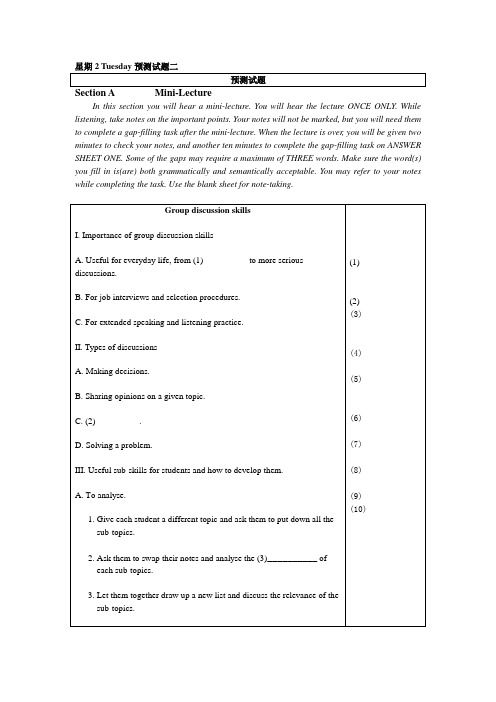
星期2 Tuesday预测试题二In this section you will hear a mini-lecture. You will hear the lecture ONCE ONLY. While listening, take notes on the important points. Your notes will not be marked, but you will need them to complete a gap-filling task after the mini-lecture. When the lecture is over, you will be given two minutes to check your notes, and another ten minutes to complete the gap-filling task on ANSWER SHEET ONE. Some of the gaps may require a maximum of THREE words. Make sure the word(s) you fill in is(are) both grammatically and semantically acceptable. You may refer to your notes while completing the task. Use the blank sheet for note-taking.Section B InterviewIn this section you will hear everything ONCE ONLY. Listen carefully and then answer the questions that follow. Mark the correct answer to each question on ANSWER SHEET TWO.Questions 1 to 5 are based on an interview. At the end of the interview you will be given 10 seconds to answer each of the following five questions.Now listen to the interview.1. Which of the following is CORRECT?[A] The man is to advertise for his new book.[B] The man specializes in communication.[C] His talk is about communication techniques.[D] His talk is actually an autobiography.2. The man did all the following EXCEPT ______ to better his presentation performance.[A] consulting some relevant books[B] communicating with good speakers[C] observing the preparation of good speakers[D] doing performance comparison with good speakers3. The man recommends the method of ______ to give a better presentation.[A] practicing it before colleagues[B] recording practice presentation rather than using colleagues[C] asking colleagues to examine the recorded practice presentation[D] learning from other real presentation videos4. Which of the following is NOT what speakers tend to worry about when making a presentation?[A] Too much nervousness.[B] Rude audience.[C] Self diffidence.[D] Equipment failure.5. In the man‘s view, the way of really overcoming nervousness is[A] preparing well.[B] relaxing face muscles.[C] concentrating on your recent enjoyments.[D] doing breathing exercises.Section C News BroadcastIn this section you will hear everything ONCE ONLY. Listen carefully and then answer the questions that follow. Mark the correct answer to each question on ANSWER SHEET TWO.Question 6 and 7 are based on the following news. At the end of the news item, you will be given 20 seconds to answer the questions.Now listen to the news.6. Which of the following in INCORRECT about the summit on Nuclear Security?[A] It is the biggest international meeting since 1945.[B] More than 50 countries have attended it.[C] It is hosted by the US and called by President Obama.[D] Ukraine has attended the summit.7. The content of the summit is[A] securing stocks of fissile material.[B] highly enriched uranium.[C] plutonium.[D] material terrorists use to build nuclear bombs.Question 8 and 9 are based on the following news. At the end of the news item, you will be given 20 seconds to answer the questions.Now listen to the news.8. What is the news mainly talking about?[A] A broken well leading to large oil spill in the Gulf of Mexico.[B] The high cost of tackling oil spill.[C] Large number of people and boats being sent to help with the oil spill.[D] The high compensation claims the oil company is facing.9. The initially calculated figure of everyday cost is[A] $33m.[B] more than $33m.[C] more than $6.6m.[D] less than $6.6m.Question 10 is based on the following news. At the end of the news item, you will be given 10 seconds to answer the question.Now listen to the news.10. Which of the following is NOT true about the explosion?[A] It could be heard from more than 8 km away.[B] It caused a woman injured.[C] The bomb was placed next to the wall housing women prisoners.[D] It exploded 20 minutes after the warning was received.W: Welcome to 'Mid Afternoon,' Dr Carter. [1.A]Now, I imagine you're here in Birmingham to promote your recently published book 'The Art of Giving Presentations', Is that right?M: Well, not really, no! In fact the book isn't really recent at all — it came out at the beginning of last year, I'm actually here this week to give a series of talks outlining some ideas I've had since then.W: So are these ideas the basis for your next book?M: Well, it's really too early to talk about that!W: I see, now tell me, [1.B]how did you become involved in this particular area of communication skills?M: Well, many years ago, as a young sales executive, I had to give presentations, but I felt I wasn't doing them very well. My boss never actually criticized me, and my colleagues weren't doing any better than me, but the point was that I didn't feel satisfied with my performance. You see, if I'm doing something, I have to do it well.W: So you decided to do something about improving your performance.M: That's right. [2.A]I tried to find some books to help me but there weren't really any available in those days... so I eventually decided on a totally practical approach: [2.B] [2.C] [2.D]I tried to find out what my problem was by studying the way the best speakers gave presentations, by talking to them, even watching them prepare. Then I compared their performance with mine. W: And what was your main problem? Nervousness? I know that's mine.M: Well I had always thought it was nervousness, and it's true that at the time I had no techniques for dealing with that. But I think audiences accept the fact that speakers get nervous, and it really doesn't matter. No, I discovered that my No. 1 problem was preparation. Nobody had ever told me anything about how to prepare, and I didn't really know how to do it properly. W: And when you realized that, what did you change?M: Well, before, I used to go through the whole presentation in an empty room on my own. The first change in my approach came when I realized it's much more realistic and much more useful to do it in front of two or three colleagues.That way you get some feedback. Otherwise you have no idea whether or not your presentation is effective, or which parts might need further attention.W: Is that the method you recommend now?M: Well, not quite. What I would advise is to make a video of your practice presentation...W: Instead of using colleagues?M: No, [3.C]a recording of your presentation to them. Then it's easier for all of you to go back and see what's wrong and how it can be improved. It's actually much better than recording other people doing real presentations, however good they are.W: So that's the preparation, but are there any factors which make the presentation itself difficult, even if you are prepared?M: Well obviously, yes. [4.B]Some speakers imagine, quite wrongly, that every audience is unfriendly, at least at the beginning. And this affects their performance. [4.C]And then there may be a few people who worry about their lack of experience of public speaking. [4.D]But really what bothers most speakers is things like the OHP and the microphone - are they going to work, and so on.W: Are there any techniques that are effective for overcoming feelings of anxiety?M: Well, first I have to say that some people never manage to reduce their anxiety levels. What they can do is learn to relax their face muscles while they speak, so that they look relaxed, even though they feel just as anxious as before. In order to really reduce anxiety, some experts recommend concentrating on something that you enjoyed recently —but I find this is hopeless... I just forget what I was about to say! [5.D]For me though, what has worked is some simple breathing exercises, breathing in deeply and slowly while making a pause. This definitely slows down the heart rate. That's what I would try first of all.W: Something we can all try — Dr Carter, thank you very much indeed.Section C News BroadcastNews Item 1News Item 2。
专八听力专业八级考试听力对策(2)

专八听力:专业八级考试听力对策(2)(2.)仔细审题审题似乎是一个老生常谈的话题,但却是十分重要的问题。
这里所说的审题并非指考生完全看不懂题目,而是指由于审题不仔细而捕捉不到问题的核心。
我们来看看下面一道题:The modern electronic anti-noise devices____.A. are an update version of the traditional methods.B. share similarities with the traditional methods.C. are as inefficient as the traditional methods.D. are based on an entirely new working principle.以上问题的核心在于领会 modern electronic anti-noise devices(现代抗噪音电子装置)的定义,而不仅仅是抗噪音电子装置),更不是一般的 anti-noise devices(抗噪音装置)。
录音中很可能出现有关anti-noise device在各个不同发展时期不同特点的信息,如果不认真审题,就会出现张冠李戴的错误。
另外,审题的仔细还表现在领悟特殊形式的题干,如否定式Which of the following is INCORRECT,或排除式All the following are true EXCEPT,等等。
正确审题是答题的关键,否则听力能力再好的考生也不会有好的成绩。
(3.)领会讲话者的语气听懂说话者的语气可帮助我们回答问题。
这一点在TEM-8听力第二部分(对话或面试)显得更为重要。
例如,Well, I’m afraid I do. But I might be mistaken. 表示了说话者不肯定的语气。
有时字面意思与说话者所要表达的意图相反,这时考生更多的是依赖讲话者的口气来答题。
听力应试技巧(TEM-8)
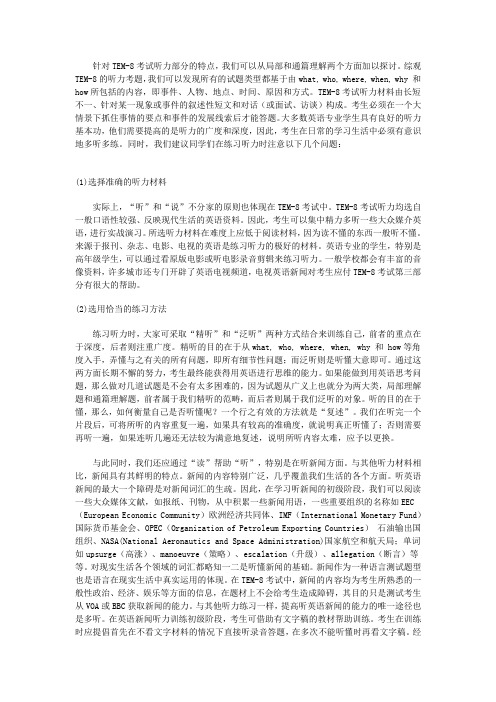
针对TEM-8考试听力部分的特点,我们可以从局部和通篇理解两个方面加以探讨。
综观TEM-8的听力考题,我们可以发现所有的试题类型都基于由what, who, where, when, why 和how所包括的内容,即事件、人物、地点、时间、原因和方式。
TEM-8考试听力材料由长短不一、针对某一现象或事件的叙述性短文和对话(或面试、访谈)构成。
考生必须在一个大情景下抓住事情的要点和事件的发展线索后才能答题。
大多数英语专业学生具有良好的听力基本功,他们需要提高的是听力的广度和深度,因此,考生在日常的学习生活中必须有意识地多听多练。
同时,我们建议同学们在练习听力时注意以下几个问题:(1)选择准确的听力材料实际上,“听”和“说”不分家的原则也体现在TEM-8考试中。
TEM-8考试听力均选自一般口语性较强、反映现代生活的英语资料。
因此,考生可以集中精力多听一些大众媒介英语,进行实战演习。
所选听力材料在难度上应低于阅读材料,因为读不懂的东西一般听不懂。
来源于报刊、杂志、电影、电视的英语是练习听力的极好的材料。
英语专业的学生,特别是高年级学生,可以通过看原版电影或听电影录音剪辑来练习听力。
一般学校都会有丰富的音像资料,许多城市还专门开辟了英语电视频道,电视英语新闻对考生应付TEM-8考试第三部分有很大的帮助。
(2)选用恰当的练习方法练习听力时,大家可采取“精听”和“泛听”两种方式结合来训练自己,前者的重点在于深度,后者则注重广度。
精听的目的在于从what, who, where, when, why 和 how等角度入手,弄懂与之有关的所有问题,即所有细节性问题;而泛听则是听懂大意即可。
通过这两方面长期不懈的努力,考生最终能获得用英语进行思维的能力。
如果能做到用英语思考问题,那么做对几道试题是不会有太多困难的,因为试题从广义上也就分为两大类,局部理解题和通篇理解题,前者属于我们精听的范畴,而后者则属于我们泛听的对象。
英语专业八级听力策略调整

英语专业八级听力策略调整随着全球化的进程和国际交流的日益频繁,英语已经成为了世界通用语言,因此掌握良好的英语听力能力对于英语专业八级考试的考生来说至关重要。
然而,许多考生在备考过程中常常陷入听力难题,无法顺利突破听力难关。
为了帮助考生有效提高英语专业八级听力水平,本文将探讨一些有效的听力策略调整。
一、拓展听力材料来源传统的听力训练模式主要依赖于教材提供的听力材料,但是这种方式显然无法满足考生的需求。
因此,考生需要主动拓展听力材料来源,包括但不限于英语新闻、纪录片、英语故事、英语电影等。
这样能够提高考生对不同领域、不同语速、不同口音的听力理解能力,有助于应对八级听力考试中出现的各种听力场景。
二、强化听力笔记技巧在听力过程中,考生需要运用技巧进行听力笔记,以便更好地理解听力内容。
首先,考生应该学会捕捉关键词,特别是涉及具体细节的信息。
其次,考生需要学会倾听数字、时间、日期等具体数据,并在笔记中准确记录。
另外,可以采用图表、流程图等形式来整理听力信息,更直观地展示听力内容,方便复习和回顾。
三、加强听力注意力持久力训练在八级听力考试中,长对话和短对话占据了很大比重,而长对话尤其考验考生的听力注意力持久力。
为了应对这一挑战,考生可以进行有意识的听力训练来增强注意力的持久性。
具体来说,可以选择一段英语故事或者英语新闻,利用定时器设定专注时间,每次逐渐延长专注时间来锻炼注意力的持久性。
四、增强听力语音辨析能力英语专业八级听力考试中常常会涉及到一些相似的语音,例如不同的发音、重音以及连读现象等。
为了更好地解决这个问题,考生可以通过大量的听力材料进行反复练习,特别关注一些常见的语音现象,例如舌尖音与舌面音的辨析、元音的短音和长音的区分等。
有条件的考生还可以通过找外教练习口语,进一步提高英语听力语音辨析能力。
五、加强听力速度适应训练听力速度往往是考生在八级听力考试中的一大挑战。
为了更好地应对快速的听力速度,考生可以找到一些大量的英语听力材料进行训练,逐渐提高自己的听力反应速度。
(建议收藏)英语专业八级阅读听力改错答题方法总结

英语专业八级阅读、听力、改错答题技巧总结英语专业八级(TEM8)阅读理解题的考试时间是45分钟,有选择题和简答题这两种题型,共22道题,共计30分。
答题步骤建议考生在做阅读题时,按照以下步骤来作答:一、通读题目(包括同一篇文章对应的选择题及简答题),标出每题的关键词。
要留意实词、数字、年份以及专有名词等。
二、带着关键词浏览文章,并定位答题关键处。
三、重点阅读答题关键处,分析得出答案。
同一篇文章的两部分题目要一起做。
5大高分策略阅读理解题在整个考试中所占比重相当大,该部分的得分直接影响到整个考试的成败,考生要予以足够的重视。
学会以下5大策略,争取高分拿下专四专八阅读理解题:一、阅读技巧,提高阅读效率1. 略读(skimming)略读,顾名思义,不需要仔细阅读全文的每一个词,而是要选择性地阅读。
略读的主要作用是了解文章大意(main idea)。
通过略读,能大大地提高阅读速度,也能获得大量的信息。
虽然大部分读者不需要正规的训练和指导就可以进行略读,但是有意识的训练有助于大大地提高略读速度和效率。
进行略读训练最简单的方法就是强迫自己在规定的时间内读完某一篇文章,在不断训练的过程中把规定的时间逐渐缩短。
略读时要高度集中注意力,努力捕捉那些能引起你注意或者你认为重要的内容。
2. 扫读(scanning)扫读,指以最快的速度扫视所读材料,在找到所需信息时才仔细阅读相关内容。
查找某个人名、地名、时间、地点等,也即在寻找特定信息、具体事实或答题所需内容时,可用这种方法。
3. 研读(study reading)研读,指仔细阅读,深刻透彻地理解所读内容。
根据考题,运用上下文、逻辑关系、背景知识进行判断和推论。
对难句的理解和翻译就要采用这种方法。
二、扩大词汇量,提高阅读速度词汇量的大小会影响到阅读理解能力,词汇量越大,阅读得越广,视野就越开阔,阅读理解的得分就越高。
多读是扩大词汇量的最好方法。
不仅要读不同体裁的书和文章,还要多接触不同题材,才能适应考试的需要。
英语专业八级考试中的听力技巧
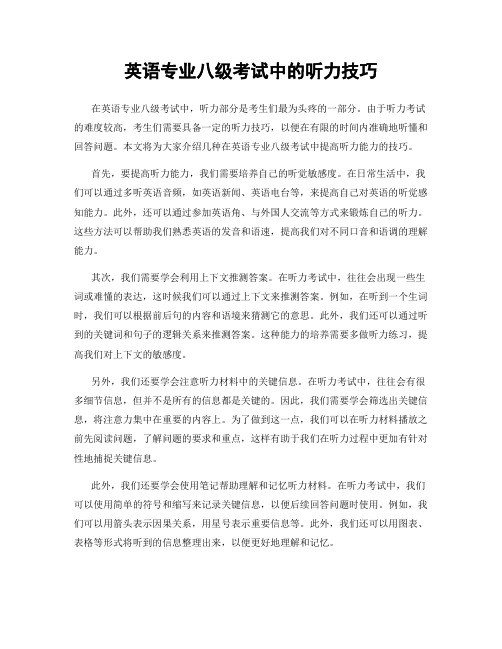
英语专业八级考试中的听力技巧在英语专业八级考试中,听力部分是考生们最为头疼的一部分。
由于听力考试的难度较高,考生们需要具备一定的听力技巧,以便在有限的时间内准确地听懂和回答问题。
本文将为大家介绍几种在英语专业八级考试中提高听力能力的技巧。
首先,要提高听力能力,我们需要培养自己的听觉敏感度。
在日常生活中,我们可以通过多听英语音频,如英语新闻、英语电台等,来提高自己对英语的听觉感知能力。
此外,还可以通过参加英语角、与外国人交流等方式来锻炼自己的听力。
这些方法可以帮助我们熟悉英语的发音和语速,提高我们对不同口音和语调的理解能力。
其次,我们需要学会利用上下文推测答案。
在听力考试中,往往会出现一些生词或难懂的表达,这时候我们可以通过上下文来推测答案。
例如,在听到一个生词时,我们可以根据前后句的内容和语境来猜测它的意思。
此外,我们还可以通过听到的关键词和句子的逻辑关系来推测答案。
这种能力的培养需要多做听力练习,提高我们对上下文的敏感度。
另外,我们还要学会注意听力材料中的关键信息。
在听力考试中,往往会有很多细节信息,但并不是所有的信息都是关键的。
因此,我们需要学会筛选出关键信息,将注意力集中在重要的内容上。
为了做到这一点,我们可以在听力材料播放之前先阅读问题,了解问题的要求和重点,这样有助于我们在听力过程中更加有针对性地捕捉关键信息。
此外,我们还要学会使用笔记帮助理解和记忆听力材料。
在听力考试中,我们可以使用简单的符号和缩写来记录关键信息,以便后续回答问题时使用。
例如,我们可以用箭头表示因果关系,用星号表示重要信息等。
此外,我们还可以用图表、表格等形式将听到的信息整理出来,以便更好地理解和记忆。
最后,要提高听力能力,我们需要多做听力练习。
在备考过程中,我们可以通过做模拟题、听力训练软件等方式进行听力练习,提高我们的听力水平。
同时,我们还可以参加听力训练班或找到一位英语教师进行辅导,帮助我们发现问题并及时纠正。
王长喜老师 专八听力周计划 第二周(听力会话)星期二

星期2 Tuesday 6大设题点一、会话开头会话的开头部分一般都会引出会话的主题,比较容易设主旨题或细节题,主要考查对会话主题或所涉及场景的把握。
二、会话结尾会话结尾往往会涉及会话双方的态度、建议或决定等总结性的内容,而且经常能够进一步体现会话的主题及场景,也是出题者设题时考虑的重点。
【例2】(05-5)三、会话中的逻辑关系处会话中经常会涉及到表示并列、转折、因果等逻辑关系的短语或句式,因果、转折等逻辑关系处,这些地方也很受出题人的青睐。
【例3】(08-1)四、会话中举例或列举处会话中常出现举列或列举的地方也常常是设题的重点,尤其是涉及列举的地方往往是Except ,Incorrect 题型的设题热点,因此听音时听到such as, two, three ,the first, the second, for example 等信息词时,应多加留意。
【例4】(05-3)五、会话中的比较对比处会话中比较对比处涉及到的是两事物或多事物,客观上能够引起考生的思维混乱,所以容易成为考试的设题点。
【例5】(10-4)六、会话中数字信息处会话中出现年代、时间、价格等数字信息的地方,也经常被作为设题的一个重点,但要注意,一般都是考查与数字相关的其他细节信息,而单纯考查数字的题目并不常见。
【例6】(10-3)Interview1. Why did the woman choose the family as a focus for her cartoon drawing?[A] Because she feels frustrated with her family life.[B] Because family is always important to her.[C] Because it is familiar and meaningful to her.[D] Because it is the only topic she knows.2. How did she feel when she signed her first contract?[A] She was thrilled.[B] She was worried.[C] She felt nervous.[D] She had a complicated feeling.3. Which of the following is NOT a concern of her daughter, a teenager today?[A] Study.[B] Appearance.[C] Friendship.[D] Allowance.4. People who have both old parents and teenage children have all the following difficulties EXCEPT that[A] they have to be the strongest in the family.[B] they feel guilty to both.[C] they have to organize their parents and argue with their children.[D] they have to find a second job to support their family.5. According to the woman, what is the most difficult thing about writing cartoon for a daily newspaper?[A] Translation.[B] Idioms.[C] Colloquial expressions.[D] Deadlines.Conversation1. When and where did the woman learn Chinese?[A] Two years ago in an American university.[B] Three years ago while traveling in Shanghai.[C] Five years ago when studying in Hong Kong.[D] Last year when teaching English in China.2. The woman tried all the following ways to learn Chinese EXCEPT[A] Learning from her students.[B] Attending Chinese class.[C] Watching Chinese movies.[D] Engaging a Chinese teacher.3. According to the woman, which experience is simple to her?[A] Learning Chinese vocabulary.[B] Watching Chinese movies every day.[C] Attending intensive language class.[D] Applying what she learned into immediate practice.4. Which of the following statement is INCORRECT about the woman?[A] She likes her students very much.[B] She is interested in Chinese culture.[C] She is able to order her meal.[D] She enjoys communicating in Chinese.5. Which is an advice she gives when learning a foreign language?[A] Do not worry about grammar rules.[B] Use it as often as possible.[C] Read books in the language every day.[D] Do not worry about making mistakes.【听力原文】M: Many of you are familiar with the very funny cartoon strip For Better or For Worse. Joining us today is the creator of that cartoon strip, Lynn Johnston. Lynn, how did you begin writing cartoons?W: Um, I think out of frustration and, um, just a need to be silly when I was really young. In fact, I found cartoons that my mother had kept from elementary school, ah, doing, ah, almost political gags about the, ah, about the Board of Education in Vancouver.M: Well, why did you choose the family as a focus?W: [1.C]Because it’s something I’m familiar with, and something that probably launches me into more fits of rage, depression, anxiety, joy, and love. All the, the gamut of emotions is there, and some people feel all those things for their job…M: There aren’t many woman cartoonists out there, Lynn. Was it hard for you to break into the business?W: No, not at all. It isn’t hard for you to break into the business if you have specific things that they’re looking for, you know, and it doesn’t matter what gender you are now. I mean, at one time maybe, women had trouble breaking in. I don’t know. I’m… I’ve just been here for the last ten years or so but, em, no, no, I had no problem and the welcome was wonderful…M: Well, that’s great. Now the cartoons you do, are they based on people in your own family?How do they feel about it?W: To begin with, they were based on my family, because I could always draw my family, and, and, I didn’t, ah, apply for this job. It was offered to me, which was amazing. I did some books on pregnancy when I was expecting my son and when he was very small, and ah, the books, ah, three small books ended up at the syndicate, and they wrote to me and asked me if I was interested in trying to do a daily comic strip, and, ah, gosh, I, I just never thought that I had that sort of resource. [2.D]I, I wasn’t thrilled at all. When I signed the contract, they all wanted to go and have dinner, and I went back to the hotel and was sick. I just really never thought that I could do it, and I chose the family because that’s what I knew the best and I could draw my family over and over again. But over the years, the characters have taken on their own, ah, specific, ah, identities and they might have the body language or speech patterns of my own family but the stories are fabricated, the situations are fabricated.M: Do you think that teenagers today have different problems and concerns from your teenage days?W: I think the problems and concerns are the same. I think they’re launched into adulthood much more quickly. I think the kids today are far ahead of us. But, and, and, I, I think that most of the things they’re facing are the same things that we faced. My daughter is fifteen. [3]She worries about her, her hair and her skin and her clothing and her marks and her friendships just as much as I did.M: What are the concerns of people caught in the middle, dealing with both bringing up their children and coping with their aging parents?W: Em,[4.B] I think that there’s guilt on both sides. Especially at, at the stage that, that you’re in at that point when your parents are, are in their seventies and your children are in their late teens —em, you’re, dealing with, with, too, you’re dealing with children who are becomingadults and with parents who are becoming children, and you’re in this state of constant, em, flux. [4.A]You don’t know where you’re going to go or where you’re going to turn, and, you know, you suddenly become the stable, ah, solid rock of the family, and I, I can’t imagine anybody who would ever consider themselves the stable solid rock. We all need a parent or someone we imagine to be more mature or more, uh, knowledgeable than we are. It’s a very difficult time. And, and both of my parents passed away recently, and dealing with all of that was very, very difficult. And I, I think the word “guilt”, you know, comes, comes forward more than anything. You don’t want to put your parents in a nursing home and, [4.C]and at the same time you’re, you’re, arguing with your children about how much freedom to give them, so you’re, you’re, letting go of your children and yet you’re suddenly organizing your parents as if they were children. It was, it was, a very, very tough time.M: I can imagine. Lynn, do your cartoons appear in other countries besides Canada?W: Yeah, em, it’s in quite a few other countries. It’s in, em, oh it’s in Japan and Britain and Australia and Sweden and Germany and Denmark and Italy…M: Fantastic.W: …and Spain and, and Mexico. It’s, it’s really, it’s translated into quite a number of different languages.M: What do you think is the most difficult thing about writing cartoons for a daily newspaper? W: Em,[5.A] I think probably the translation, because I use a lot of colloquial expressions, like "paying through the nose". We know what that means in English, but how does it translate into Japanese? And so the translators really have a, a challenging job, to try and make the comic strip make sense and still have a punch line of some sort. And I know they hire very talented cartoonists and comedy writers in other countries to do this. But, you know, I don't know, I can't speak Danish so I don't know how to translate it into Danish. But I've met the translator and he assures me it's great.M: Well, Lynn. You're doing a remarkable job and your cartoon strip is enjoyed by millions.Thank you very, very much for spending some time with us today.W: Oh, you're very welcome. Thank you for calling.【听力原文】M: Good afternoon, Wynet.W: Good afternoon.M: I understand that you’ve learned at least one other language, ah, is that right?W: That’s true. I’ve learnt two, French and Mandarin Chinese.M: OK, and, ah, how did you learn Mandarin?W: [1.D]I learned Mandarin while I was in the People’s Republic of China. I was there last year teaching English.M: And what made you decide to learn Mandarin while you were in China? Did you have to…W: No, but I wanted to be able to communicate with the people in their own language.M: OK, and how exactly did you go about learning Mandarin?W: [2.A]I began to pick words up from some of my students or while I was out in the market doing shopping, trying to do shopping, [2.B]but then I began to attend a class that was intensive four hours a day to pick up the basics of Chinese which is quite a difficult language. M: And how long did this class go on?W: I attended it for about a month.M: And then what happened?W: Then I learnt most of my Chinese from students who would take me to the market and they would teach me words in Chinese and I would reciprocate by teaching them the English word.[2.D]And I also had a tutor who would teach me about twice a week.M: OK. So you felt the need for some additional, ah, classes?W: Yes.M: OK. What would you say was the most difficult thing about learning Mandarin Chinese?W: For me it was the tones.M: The tones, why was that?W: I don’t have a very good ear for, for tones so it was. I always had to work at getting the right, the right pitch.M: Yes.W: And, which is quite important because you have one pronunciation of a word depending on the tone,otherwise it will be something completely different. It may have four meanings so it’s quite important to get the correct pronunci…or the correct tone.M: And I suppose the grammar and the vocabulary must be very, very different from English. W: Quite different. But actually the grammar is quite simple. You don’t have to worry about different, ah, verb, verb tenses…M: Oh, great.W: So to me that was a welcome relief from French.M: But the vocabulary, a lot of memory work I imagine.W: A lot. Especially if you want to learn the written language.M: [3.D]Was there anything, ah, easy about the, ah, the experience of learning Mandarin Chinese?W: Definitely. Living in the country I was able to take what I was learning in the classroom or from my tutor and go immediately into a situation where I was able to apply it.M: Oh, alright.W: Going to a market to buy my food, to a store to buy some clothes, to buy a train ticket, to go ona journey.M: So you were very motivated then.W: Definitely. Because there were many people who don’t speak English and so it cuts you off from so much of the population and so many things.M: So, I guess it’s pretty clear that you liked the experience.W: Oh, I enjoyed it very much. I would love to do it again.M: [4.A]What did you like most about it? Can you remember?W: I think the time I spent with my students.M: Alright.W: [4.D]And being able to go somewhere and understand what was going on and having somebody to help me. [4.C]Just being able to go into a restaurant and order my own meal. M: [4.B]I suppose you really have a lot better idea about Chinese culture because you’ve learned the language.W: I think so. It…I would be able to communicate with people other than ones who were just in school, in university so it enlarged the number of people and from what backgrounds I could talk to.M: Umm, since you’re learned two languages, one of them a language very different from you mother tongue, would you have any kind of advice to give to someone learning a new language?W: Well, depending on the situation you’re in. I think it’s always helpful to, to keep maybe a diary of what you’re learning so that or some sort of phrase book. For me that was very helpful. M: Alright.W: Umm. [5.D]Also, having learnt two languages, the thing…to me is most important is just being able to get over that, umm, worry of being laughed at.M: Alright.W: [5.D]At saying the thing, the wrong thing. Saying it in the wrong tone for Chinese.M: How, how did you get over that?W: I found people there so enthusiastic that I would be able to even say hello…M: Yes.W: …[5.D]that I wasn’t worried about making a mistake. And I found people so helpful, that they would correct me and so for me that was the most im…the hardest thing to do in earning a language, was just getting beyond that point.M: Alright and how fluent were you by the time you left China?W: Well, I couldn’t have a philosophical discussion, but I was able to go to a restaurant, buy clothes, buy a train ticket, have a basic conversation with people.M: OK. Well. Look, Wynet, thanks a lot for coming and taking with us today. It’s been really interesting.W: It’s been fun, thank you.M: Bye-bye.【答案解析】。
专八英语听力答题方法

专业八级(TEM-8,Test for English Majors-Band 8)是中国英语专业学生参加的一项高级水平测试,其中的听力部分是一个重要的组成部分。
以下是一些专八英语听力的答题方法和建议:1. 预览选项:在听力开始之前,快速浏览问题和选项。
根据选项中的关键词,预测可能出现的场景和主题。
2. 抓住主旨:在听对话或短文时,注意开头和结尾,这些部分通常会包含主旨信息。
同时,听懂主题后,要有意识地筛选与主题相关的信息。
3. 视听一致原则:如果在听的时候发现原文和某个选项大致相同,那么这个选项很可能是正确的。
同时,注意听到的信息是否与选项中的关键词相符。
4. 注意细节:在长对话中,细节题通常要求你注意but、so、however等逻辑词,以及unfortunately、unexpectedly等情节提示词。
此外,注意极端词(如最高级、比较级)和语气、语调的变化。
5. 边听边记:在听的过程中,用简单的笔记记录下重要的信息,如人名、地点、数字、时间等。
这些信息在回答问题时可能会用到。
6. 排除法:如果某个选项在听的过程中明显与原文不符,可以先排除。
对于不确定的问题,可以采用排除法来选择最可能的答案。
7. 专注与灵活相结合:虽然需要专注于听到的内容,但也要有一定的灵活性,及时调整对场景和问题的预测。
8. 练习与复习:长期提高英语听力水平需要大量的练习和复习。
可以通过模拟真题、观看英语电影、听英语广播等方式来提高听力。
9. 考试策略:在考试中,如果遇到特别难的问题,不要纠结,标记后继续听后面的内容。
听力结束后,可以回头再解决这些问题。
10. 心理准备:保持良好的心态,不要因为一两个问题而影响整体的发挥。
记住,这些方法需要通过不断的练习和应用来加以熟悉和掌握。
在专八考试的听力部分,不仅要求考生有良好的听力技能,还要求考生能够快速准确地运用这些技能来解题。
- 1、下载文档前请自行甄别文档内容的完整性,平台不提供额外的编辑、内容补充、找答案等附加服务。
- 2、"仅部分预览"的文档,不可在线预览部分如存在完整性等问题,可反馈申请退款(可完整预览的文档不适用该条件!)。
- 3、如文档侵犯您的权益,请联系客服反馈,我们会尽快为您处理(人工客服工作时间:9:00-18:30)。
Mini-lecture (Question and Solutions)I. The Most Concerned Question:The reasons why we can’t make full understanding of the listening materials are listed as following:1:Accents.Many weak forms,liaision,and the words with only one vowel.These factors can be ignored by your ears easily.I suppose the only way to solve the problem is practicing more.2.V ocabulary:This is the problem that almost every English student may meet.I am still looking for efficient skills to recite the words and prhases.What’s worse,sometimes even you already remember the word, it can still be forgotten.3:Short-term memory:We can’t write down all the words immediately while the speeker’s pacing is fast.(Especially in the mini-lecture.)When I take notes while audio materials are on, sometimes the functional words don’t appear, and I really can’t identify the paragraph content whether it is intensive listening or extensive listening.Many examples usually are used to attest the theory. But the blanks sometimes require to be filled with the details. I don’t know whether to take that down or not. If I take it down, I could miss the next main point with the unfinished examples. If I just depend on the comprehension of the main point, I may forget the specific examples.Occasionally I considered that I understand the whole text and the main points, in reality, the words I filled in the blanks are just not the right ones. Does this mean that I still don’t get the whole meaning or I don’t comprehend the sentences with blanks completely?I find it difficult to assure an efficient way for getting necessary information for short-term memory to fill the blanks. As I practice more, the fewer I use the abbreviations. I don’t know how it happened, but it came out just like that.(英法二班夏薇薇) II. Possible Solutions:(1.)听与记录同时进行考生可在听的过程中适当做些笔录因为仅凭脑力无法记住长达数分钟的讨论或对话。
考生在记录时不必拘于形式,做一些只要自己能明白的简单符号记录即可,特别是众多的数字、时间、日期、人名、地名更需要我们做些笔记。
而且,TEM-8听力第四部分正是考察“听和“记”的同步能力。
TEM-8听力第四部分记笔记填空是较为复杂的听力测试项目,有其自身特点,掌握这些特点对考生大有好处。
该部分录音通常是一篇具有较强逻辑性的篇章,从几个方面论证或叙述一个问题。
因为考生须填空的词是基于整个题要点及其重要细节的实词,所以考生在记笔记时应重点盯住这些内容,而非繁文褥节。
举个例子,如果录音中出现了关于一个问题的三四个例证,如为了说明fast food而列举了Kentucky Fried Chicken,McDonalds,Pizza Hut等等,考生最多记住一两个即可。
另外,用于填空的词不一定非得是录音中出现的词,凡是在语义上与原文一致且语法上与填空短文相适应的单词均可。
本书练习题该部分并不局限于书中所给出的答案,可能的答案也许有更多,大家可自行掌握。
填空时,考生一定要注意所填单词的词性准确无误。
我们发现,有的考生能找出一个意义相应的词,但不是很注意词性,因为该填动词的地方一定要填动词,如不能用intense来代替intensify。
另外,倘若所填单词在句首,该单词首字母要大写。
最后,希望广大考生千万不要盲目信仰应试技巧而忽视语言基本能力的训练,因为技巧只不过是以扎实语言基本功为基础的一点儿辅助性的东西而已。
(英法二班,程琦)(2)备考笔记填空题,考生必须重点训练两种能力:一是通过捕捉语义标识语(semantic marker)来追踪讲座的逻辑发展、区分主次信息的能力;二是在归纳、筛选的基础上快速且有条理的记录讲座重要信息的能力,即记笔记的能力。
虽然这个部分确实让人饶头,刚开始练习的时候正确率比较低,但大家一定要耐心,多做练习,反复听,mini-lecture的小窍门就是答案大多是名词居多,然后是形容词,最后才是动词。
所以大家听的时候一定要对文章中的名词和形容词多留个心眼,还有就是一定要把握文章的结构,练得多了,自然就有感觉了。
然后就是速记符号的使用,这个东西因人而异,所以不必拘泥于一种速记符号,只要自己能明白就好,举例来说,information---info,但是大家千万不要陷入到这样一个误区,就是光想着速记,而忘了你使用这些符号的目的,为的就是得分,所以在听的时候要有个模糊的general idea。
提高的方法和建议:(1)加强储存记忆(memory span):做到这一点需要按意群捕捉讲述内容,不要一字一字地听,而要抓住关键词或句。
听完一段不可能一字一句地回忆,而要建立整体概念。
(2)加强及时反映(immediate recall):只有当你建立了整体概念,才能达到立即回忆。
(3)做简短笔记(brief note—taking):在听较长材料时,用缩写或自己能看懂的点、线或其它标记做些快速记录,如:数字、地点、人名或其它关键词语等。
(4)多做听写和记笔记训练(dictating & note—taking):这种练习有助于储存记忆,训练抓住关键词或句,以及中心思想。
(5)精听与泛听(intensive & extensive listening):同一段内容反复听若干次,这样有助于增加记忆的持续时间;听不同内容的材料,有助于增加听各种不同声音,口音及语速的经验。
前者属于精听,后者为泛听,两者应有机结合起来。
(6)训练听与寻找答案同时进行(looking for the right answer while listening):在听的同时迅速浏览各项选择,只需细看各项选择的不同部分,而相同的部分只看第一个即可,这样可以节省时间以便多做思考。
当然,如果能巧妙地利用每一部分考题的空隙快速浏览一下所要做的习题的选择项,那是再好不过了。
因此,特别要提醒考生的一个诀窍就是:当听力理解的每一部分开始放音时,总要有一长段的题目指令(Instructions)与例题(Sample),考生可以不必去听它,因为听与不听根本不会影响你后面的答题。
利用这一段时间,大致推测一下录音内容大有益处。
望考生千万不要错过这个时机。
(英法二班刘怡炘)(一)Section A:Mini-lecture 讲座部分讲话或讲座都是考生感到较为困难的项目,所以2004年高校英语专业八级考试大纲在这方面作了较大的调整,即把Section D中的Note-taking & Gap-filling(记录与填空)这一项与原来的第一项Talk(讲话)合二为一,字数由原来的700字增加到900字,分数也由原来的15分(SectionA5分+SectionDl0分)改为现在的10分。
这部分内容广泛,题材多样,观点和态度一般也较为新颖,2004年新大纲在字数上又有新的增加,难度应该说是加大了。
从2005年的八级统测开始,字数由原来的700字增加到900字。
我们说该部分内容广泛,题材多样,可从近几年的考题中看出来。
比如,2003年专业英语八级的考试中,该部分谈的是modern company and harmonious work relations (现代公司与和谐的工作关系),谈话者对现代化的公司进行了描述,也对建立和谐的劳资双方的关系阐述了自己的看法,另外还对大公司中工会的作用进行了阐述。
1999年则谈了anti-noise devices(如何制止噪音污染的问题)。
在现代文明不断向前发展的今天,噪音污染成了公害之一,越来越危及人民的健康。
本题及时的提出了解决办法,正当此时,且时代性较强。
2000年的试卷中讲了the differences between modem private and public libraries(私营与公共图书馆之区别的问题)。
图书馆的作用与昔日相比发生了很大变化。
公共与私营图书馆的经营方式、功用等也不一样。
对此,谈话者都谈了个人的看法。
不论这些讲话所涉及的内容属于哪一方面,讲话者一般都既会对问题阐述看法,又可能会对某个问题提出建议或者批评,有时甚至还会谈古论今,进行对比,这些都是需要听者认真去理解的。
对此,听者就要有充分的思想准备,平时多听广播,多看报纸,多关心国内外大事。
